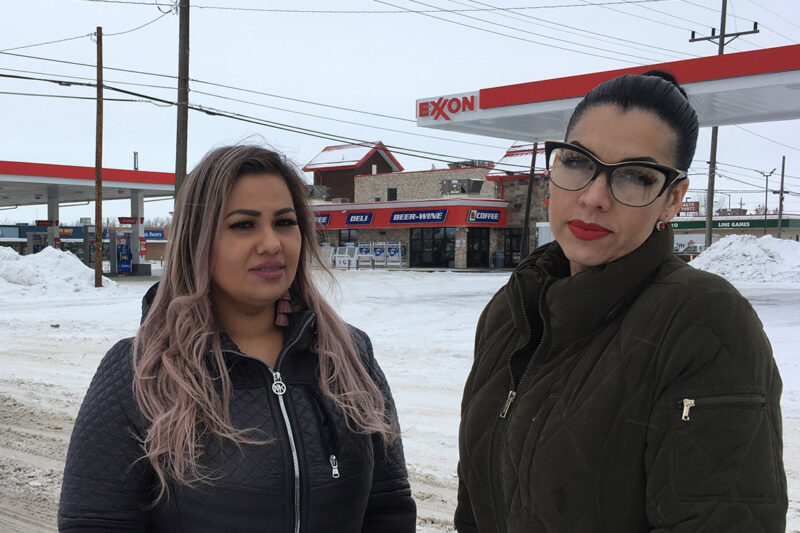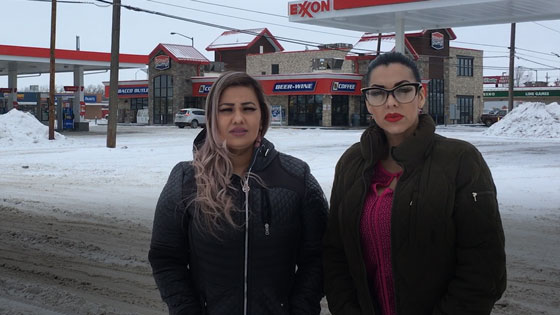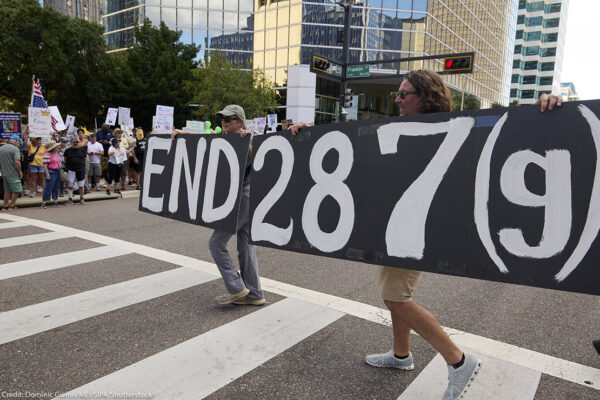Border Patrol Detained Me for Speaking Spanish in Montana. Then My Town Turned Against Me.


I moved to Havre, Montana — near the U.S.-Canada border — in 2014 with my husband and our two young children. Home to around 10,000 people, I’ve always found Havre to be a friendly town, one where I felt good about raising my kids. But that all changed last May when my friend and I were illegally targeted and detained by a Customs and Border Protection agent, just for speaking Spanish to each other in a convenience store.
I didn’t think it was possible for one incident to change our lives, but that’s exactly what happened.
It started in the Town Pump, a local convenience store, where my friend Mimi and I were waiting in line to pay for eggs and milk. There was a Border Patrol agent standing behind us in line, which is not uncommon since there are a lot of Border Patrol in Havre. Mimi said hello to him — it’s that kind of small town — but instead of saying hello back, he commented that she had a strong accent and asked where we were both born.
The question didn’t feel friendly, and I was taken aback. I asked, “Are you serious?” And he responded that he was “dead serious.”


%3Ciframe%20allow%3D%22accelerometer%3B%20autoplay%3B%20encrypted-media%3B%20gyroscope%3B%20picture-in-picture%22%20allowfullscreen%3D%22%22%20frameborder%3D%220%22%20height%3D%22315%22%20src%3D%22https%3A%2F%2Fwww.youtube.com%2Fembed%2FRy8BqMjVbkk%3Fautoplay%3D1%26version%3D3%22%20thumb%3D%22https%3A%2F%2Fwww.aclu.org%2Fsites%2Fdefault%2Ffiles%2Fweb19-mimianasuda-thumb-560x315.jpg%22%20width%3D%22560%22%3E%3C%2Fiframe%3E
Privacy statement. This embed will serve content from youtube.com.
Mimi and I are both U.S. citizens, born in Texas and California respectively, who grew up speaking Spanish. Other people in Havre have asked me where I’m from before, but I never minded the questions because they came from a place of curiosity. My go-to reply was always, “I’m an American with a sexy accent.”
But this was different.
After Mimi and I told the officer that we were born in the U.S., he demanded that we show identification. I didn’t feel like I could say no since he was in uniform and armed. We gave him our Montana driver’s licenses and then followed him outside into the store’s parking lot as directed.
Agent O’Neal — the name on his badge — got on his car radio and asked for backup, as if two moms holding a carton of eggs were a threat. As we stood there, I felt a knot in the pit of my stomach. I told him that I was going to start filming on my cell phone. Then I made a simple request, “Can you tell us in video why you asked for our ID’s please.”
He said it was because, “You guys are speaking Spanish which is very unheard of up here.”
As we waited for him to run our IDs, cars were driving by. The Town Pump is right on the main highway, so it was easy for people to see me and Mimi in the parking lot by the patrol vehicle. Other Border Patrol cars pulled up, with the agents in uniform and guns, including Agent O’Neal’s supervisor. When I asked him whether we would have been detained for speaking French, he said, “No, we don’t do that.” I told them I needed to get back to my family, that I was an American citizen with rights, but the agents would not return our IDs to us. Finally, at the end, they handed them over and said we could leave.
The whole exchange took about 40 minutes. The consequences from it continue to this day.
LEARN MORE ABOUT THE LEGAL ACTION
After the video of the stop was picked up by the news, Mimi and my families have been harassed repeatedly for speaking out. We received hateful messages from people across the country, but the worst was what happened in our own town, a place I considered home. At his high school, a teacher asked Mimi’s son whether he had brought his ID to class. My 8-year-old daughter is scared to speak Spanish and has started responding to me in English when I ask her questions.
Now when I go out to run errands, I consciously try to leave my kids at home, in case someone will start yelling at me or even physically attack me. I don’t want them to see that. I’ve had people yell at me in restaurants and bars, saying that I am “an illegal.”
Life hasn’t changed just for our families. Other Mexican and Latinx people in Havre have approached us in the grocery store or on the street, fearful about whether they could also be stopped by Border Patrol just for speaking Spanish or looking differently.
In some ways, it would have just been easier to stay quiet about the incident. Maybe life would have gone back to normal, but then I think about my kids. I want them to not only be proud of being bilingual, but I also want them to know that they live in a country where people can’t just be stopped and interrogated based on how they look and sound. That's why Mimi and I are suing CBP for violating our rights.
I know this is an important fight — not just for Latinx people, but for any community that CBP views with suspicion. One of the things that helped me right after the incident was that people in Native-American communities nearby started to send me messages of support, encouraging me to keep speaking out against this abuse.
I know this fight is bigger than just us. Mimi and I can’t erase what happened that night, but we can do everything in our power to ensure it doesn’t happen to someone else.



